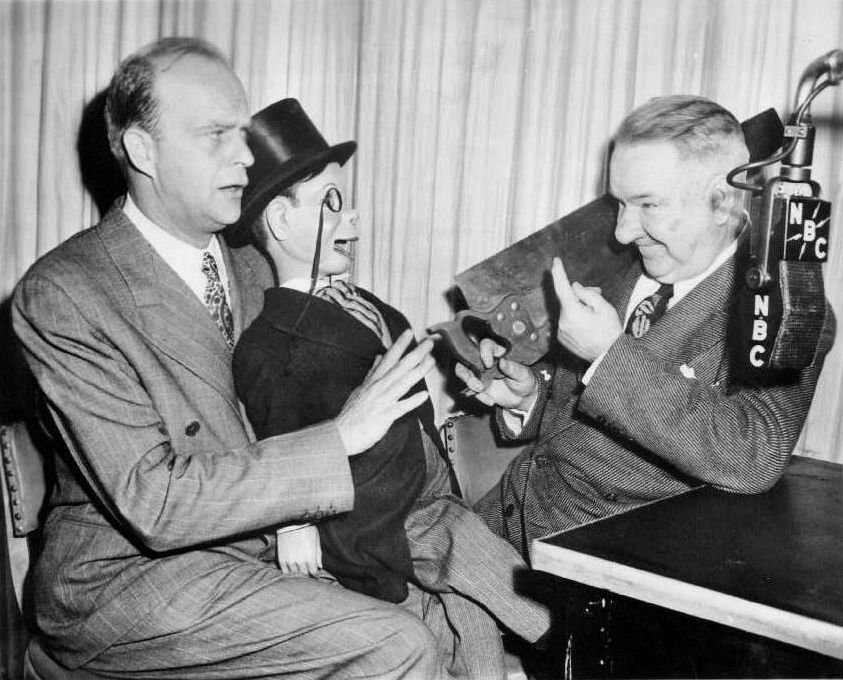Happy Birthday, W.C. Fields!
One of the funniest men to ever walk this planet was born one hundred and thirty-five years ago on this date; his birth name was William Claude Dukenfield, but modern audiences know him as W.C. Fields. Fields cultivated a persona on stage, screen and radio of a beloved misanthrope—an individual who drank, smoke, lied, cheated and gambled…and was rewarded for such behavior at a time when moral scolds and bluenoses looked down at such goings-on. The Great Man is perhaps best known for endearing himself as a sympathetic underdog to audiences despite such vices…as well as a barely-concealed dislike for dogs and children.
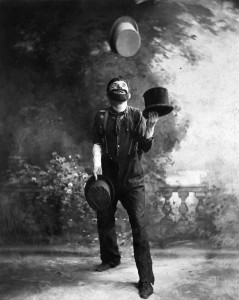 Much of Fields’ character flaws on stage and in the movies would later be assimilated into the biographical sketch that was the man in person—Fields himself enjoyed frequently embellishing the details of his life, portraying himself as a character that leapt full-blown out of a Charles Dickens novel. Most of the real truth about W.C. would later be presented in a 1973 book written by his grandson Ronald Fields, W.C. Fields by Himself. On the professional side, Fields began his show business career in 1898 as a “tramp juggler” in vaudeville, demonstrating a dexterity in juggling objects (cigar boxes, balls, etc.) that would later be showcased in such feature films as The Old Fashioned Way (1934). His big professional break on the stage would arrive in 1915 when he appeared as a featured performer in the Ziegfeld Follies on Broadway; at that same time, he also made his first foray into the medium that would bring him his greatest fame, starring in a pair of short comedies (Pool Sharks and His Lordship’s Dilemma) that were filmed in New York during his Follies work.
Much of Fields’ character flaws on stage and in the movies would later be assimilated into the biographical sketch that was the man in person—Fields himself enjoyed frequently embellishing the details of his life, portraying himself as a character that leapt full-blown out of a Charles Dickens novel. Most of the real truth about W.C. would later be presented in a 1973 book written by his grandson Ronald Fields, W.C. Fields by Himself. On the professional side, Fields began his show business career in 1898 as a “tramp juggler” in vaudeville, demonstrating a dexterity in juggling objects (cigar boxes, balls, etc.) that would later be showcased in such feature films as The Old Fashioned Way (1934). His big professional break on the stage would arrive in 1915 when he appeared as a featured performer in the Ziegfeld Follies on Broadway; at that same time, he also made his first foray into the medium that would bring him his greatest fame, starring in a pair of short comedies (Pool Sharks and His Lordship’s Dilemma) that were filmed in New York during his Follies work.
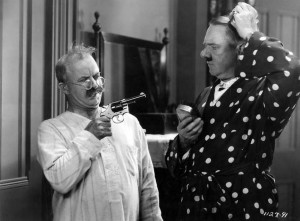 His stage work kept him out of motion pictures until 1924, when he graced the cast of the Revolutionary War drama Janice Meredith (1924); Fields later reprised his starring role from the 1923 musical comedy Poppy in the D.W. Griffith-directed Sally of the Sawdust (1925). It’s a bit of stretch to think of W.C. Fields as a silent comedian, particularly in light of his memorable later performances in talkies, but surviving features like It’s the Old Army Game (1926; with Louise Brooks) and So’s Your Old Man (1926) demonstrate that Fields could be just as funny without sound. Both of these movies would later be refashioned into sound features; Old Man was reworked as You’re Telling Me! (1934) and sections of Army Game were appropriated into It’s a Gift (1934), which fans of The Great Man consider one of his comedic masterpieces. Working for Paramount in the 1930s, W.C. also starred in such now-classic comedies as Tillie and Gus (1933), Man on the Flying Trapeze (1935) and Mississippi (1935), and all-star romps like Million Dollar Legs (1932) and International House (1933).
His stage work kept him out of motion pictures until 1924, when he graced the cast of the Revolutionary War drama Janice Meredith (1924); Fields later reprised his starring role from the 1923 musical comedy Poppy in the D.W. Griffith-directed Sally of the Sawdust (1925). It’s a bit of stretch to think of W.C. Fields as a silent comedian, particularly in light of his memorable later performances in talkies, but surviving features like It’s the Old Army Game (1926; with Louise Brooks) and So’s Your Old Man (1926) demonstrate that Fields could be just as funny without sound. Both of these movies would later be refashioned into sound features; Old Man was reworked as You’re Telling Me! (1934) and sections of Army Game were appropriated into It’s a Gift (1934), which fans of The Great Man consider one of his comedic masterpieces. Working for Paramount in the 1930s, W.C. also starred in such now-classic comedies as Tillie and Gus (1933), Man on the Flying Trapeze (1935) and Mississippi (1935), and all-star romps like Million Dollar Legs (1932) and International House (1933).
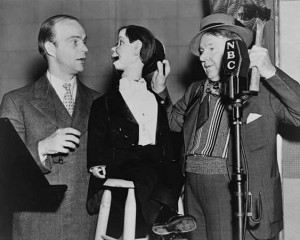 After finishing his sound remake of Poppy (1936), Fields checked into a sanitarium to recuperate from disorders brought upon by his habitual drinking. W.C. had turned down all previous offers to do a radio show, but after hearing the comedian on a tribute broadcast to Adolph Zukor (W.C. broadcast right from his sanitarium room), the producers of The Chase and Sanborn Hour made him an offer he couldn’t refuse: $6500 a week to perform alongside the likes of Nelson Eddy, Dorothy Lamour and Don Ameche when the program made its debut over radio in May of 1937. (Fields’ ill health at the time convinced him it would be easier to do radio than a feature film.) It was on this show that Fields instituted a “feud” that would become as famous as the on-air squabbles between Jack Benny & Fred Allen and Ben Bernie & Walter Winchell; the undisputed weekly comedic highlight of The Chase and Sanborn Hour was when W.C. matched wits with radio’s most popular brat, Charlie McCarthy (the creation of Edgar Bergen).
After finishing his sound remake of Poppy (1936), Fields checked into a sanitarium to recuperate from disorders brought upon by his habitual drinking. W.C. had turned down all previous offers to do a radio show, but after hearing the comedian on a tribute broadcast to Adolph Zukor (W.C. broadcast right from his sanitarium room), the producers of The Chase and Sanborn Hour made him an offer he couldn’t refuse: $6500 a week to perform alongside the likes of Nelson Eddy, Dorothy Lamour and Don Ameche when the program made its debut over radio in May of 1937. (Fields’ ill health at the time convinced him it would be easier to do radio than a feature film.) It was on this show that Fields instituted a “feud” that would become as famous as the on-air squabbles between Jack Benny & Fred Allen and Ben Bernie & Walter Winchell; the undisputed weekly comedic highlight of The Chase and Sanborn Hour was when W.C. matched wits with radio’s most popular brat, Charlie McCarthy (the creation of Edgar Bergen).
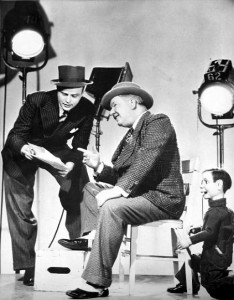 “Tell me, Charles—is it true your father was a gate-leg table?” Fields asked his wooden nemesis on one broadcast. “If he was,” Charlie retorted, “your father was under it!” W.C. Fields possessed a legendary jealousy toward other comedians but had nothing but praise for Charlie’s “guardian,” Edgar Bergen, admiring Bergen’s talent and timing. (The Great Man, on the other hand, was not particularly enamored of Charlie—according to Don Ameche, who often “refereed” their verbal sparring—even resorting to threatening to saw McCarthy in two during another broadcast.) Fields’ stint on the Chase and Sanborn broadcasts was fairly brief—more than a few sources note that the unpredictable comedian steadfastly refused to “clear” material with the Standards & Practices folks beforehand—but he remained a frequent guest on Edgar & Charlie’s program after his departure and up until his passing in 1946. Edgar & Charlie (and Mortimer!) even co-starred with W.C. in his first film for Universal, 1939’s You Can’t Cheat an Honest Man.
“Tell me, Charles—is it true your father was a gate-leg table?” Fields asked his wooden nemesis on one broadcast. “If he was,” Charlie retorted, “your father was under it!” W.C. Fields possessed a legendary jealousy toward other comedians but had nothing but praise for Charlie’s “guardian,” Edgar Bergen, admiring Bergen’s talent and timing. (The Great Man, on the other hand, was not particularly enamored of Charlie—according to Don Ameche, who often “refereed” their verbal sparring—even resorting to threatening to saw McCarthy in two during another broadcast.) Fields’ stint on the Chase and Sanborn broadcasts was fairly brief—more than a few sources note that the unpredictable comedian steadfastly refused to “clear” material with the Standards & Practices folks beforehand—but he remained a frequent guest on Edgar & Charlie’s program after his departure and up until his passing in 1946. Edgar & Charlie (and Mortimer!) even co-starred with W.C. in his first film for Universal, 1939’s You Can’t Cheat an Honest Man.
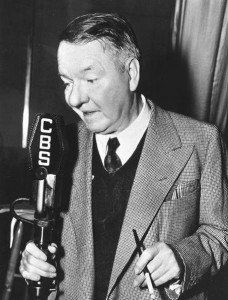 In the fall of 1938, W.C. Fields became the star attraction on radio’s Your Hit Parade, adding comedy to the popular variety program that counted down the week’s most listened-to songs in the nation. Like his Chase and Sanborn duties, W.C.’s time on Parade was also brief…but it did provide a momentary bit of subversive Fieldsian humor when the star took to reading letters from his son Chester each week on the show. It took sponsor Lucky Strike a while to catch on that their star comedian was getting mail from “Chester Fields”…but when they did figure it out, the letters came to a screeching halt.
In the fall of 1938, W.C. Fields became the star attraction on radio’s Your Hit Parade, adding comedy to the popular variety program that counted down the week’s most listened-to songs in the nation. Like his Chase and Sanborn duties, W.C.’s time on Parade was also brief…but it did provide a momentary bit of subversive Fieldsian humor when the star took to reading letters from his son Chester each week on the show. It took sponsor Lucky Strike a while to catch on that their star comedian was getting mail from “Chester Fields”…but when they did figure it out, the letters came to a screeching halt.
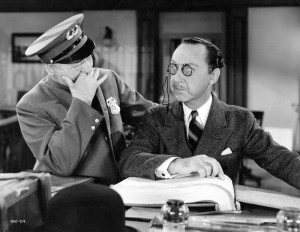 Aside from guest appearances on the Bergen-McCarthy and Frank Sinatra programs—and the occasional turn on Mail Call and Command Performance—W.C. Fields continued his movie career with the likes of My Little Chickadee (1940; in which he was paired with the equally legendary Mae West) and The Bank Dick (1940), every bit a classic as the earlier It’s a Gift. Fields would peddle his comic wares in one more starring role in Never Give a Sucker an Even Break (1941), then limited his onscreen activities to minor appearances in features such as Follow the Boys (1944) and Song of the Open Road (1944). Years of hard drinking finally caught up to him on (here’s a slice of irony for you) December 25, 1946, when he left this world for a better one at the age of 66.
Aside from guest appearances on the Bergen-McCarthy and Frank Sinatra programs—and the occasional turn on Mail Call and Command Performance—W.C. Fields continued his movie career with the likes of My Little Chickadee (1940; in which he was paired with the equally legendary Mae West) and The Bank Dick (1940), every bit a classic as the earlier It’s a Gift. Fields would peddle his comic wares in one more starring role in Never Give a Sucker an Even Break (1941), then limited his onscreen activities to minor appearances in features such as Follow the Boys (1944) and Song of the Open Road (1944). Years of hard drinking finally caught up to him on (here’s a slice of irony for you) December 25, 1946, when he left this world for a better one at the age of 66.
W.C. Fields left behind a rich cinematic legacy that continues to attract admirers and fans of all stripes and generations; film critic Roger Ebert once described the timelessness of the Great Man thusly: “It is the appeal of the man who cheerfully embraces a life of antisocial hedonism, basking in serene contentment with his own flaws.”
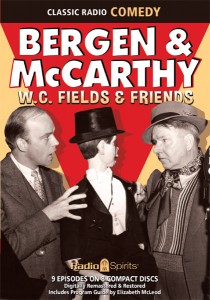 You can check out some of his film classics for yourself in the DVD set W.C. Fields Comedy Collection: Volume II (which features my favorite of The Great Man’s sound features, Man on the Flying Trapeze), as well as the collection Hollywood on Parade, Volume 1. No Fieldsian scholar can be without Radio Spirits’ Bergen & McCarthy: W.C. Fields and Friends, a CD set that showcases many of Fields’ Chase and Sanborn Hour appearances and a few guest shots with Edgar and Charlie from the 1940s…including his final work with the duo on that show from March 24, 1946.
You can check out some of his film classics for yourself in the DVD set W.C. Fields Comedy Collection: Volume II (which features my favorite of The Great Man’s sound features, Man on the Flying Trapeze), as well as the collection Hollywood on Parade, Volume 1. No Fieldsian scholar can be without Radio Spirits’ Bergen & McCarthy: W.C. Fields and Friends, a CD set that showcases many of Fields’ Chase and Sanborn Hour appearances and a few guest shots with Edgar and Charlie from the 1940s…including his final work with the duo on that show from March 24, 1946.

